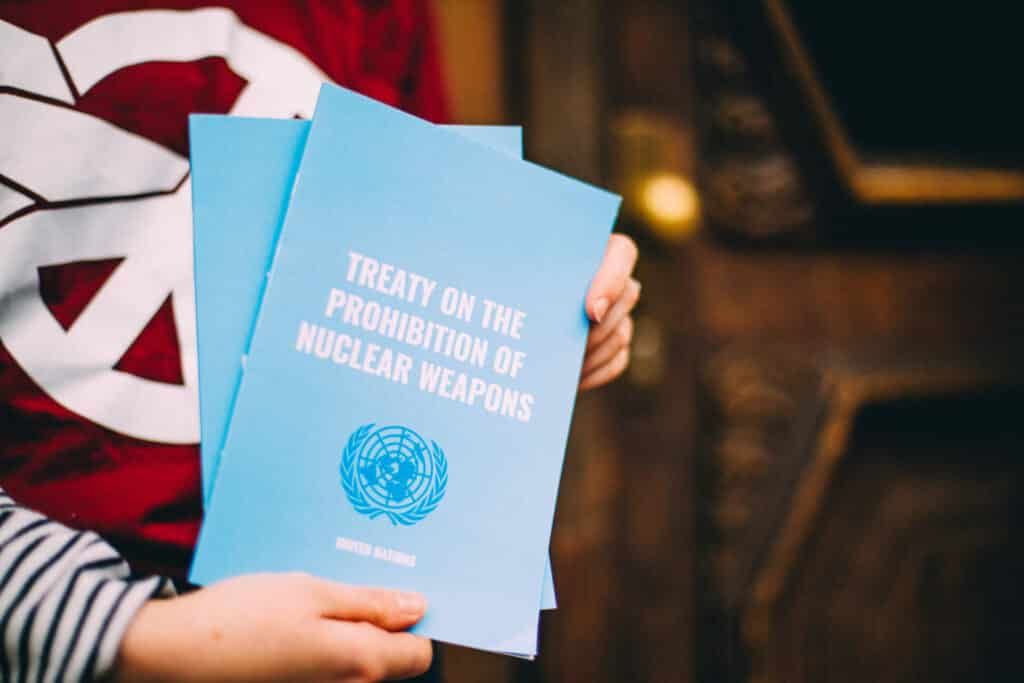A strong multilateral system must live up to commitments on nuclear disarmament
By Ernesto Zedillo | December 11, 2023
 UN Treaty on the Prohibition of Nuclear Weapons entered into force in January 2021. Photo by Aude Catimel for ICAN
UN Treaty on the Prohibition of Nuclear Weapons entered into force in January 2021. Photo by Aude Catimel for ICAN
A strong multilateral system grounded in respect for international law is indispensable for tackling the existential threats facing humanity. This is particularly true for the dangers still posed by nuclear weapons nearly 80 years after Hiroshima and Nagasaki. Indeed, the biggest existential risk for our world may stem from the unravelling of the nuclear non-proliferation and disarmament regime that was built up painstakingly in the decades after 1945 during the tensions and brinkmanship of the Cold War.
Today, the Treaty on the Prohibition of Nuclear Weapons (TPNW), also known as the ban treaty, is an important new element in the international architecture of arms control agreements. It comes at a time when, once again, geopolitical tensions are worsening between the major powers.
The second meeting of states parties to the TPNW, which took place last week at the UN headquarters in New York, should spur the ambition of all global leaders to work for the values at its heart: multilateralism, peace, and human rights.
These values of multilateralism are important precisely at a time when actions by many governments violate international law and undermine the multilateral system on many fronts. This is certainly true for crucial issues such as climate change; prevention and response to pandemics; governance of economic interdependence; and international cooperation for development.
Alarmingly, it is also the case for international peace and security. Since the beginning of this new century, governments have repeatedly ignored diplomacy, breaching international law, and bypassing multilateral institutions.
For good reason, the world’s attention has focused on recent events such as Russia’s deplorable invasion with nuclear threats over Ukraine, its suspension of participation in New START (the US-Russian treaty that limits their deployed long-range nuclear forces), and the revoking of its ratification of the Comprehensive Nuclear-Test Ban Treaty (CTBT). However, we must also admit that the unravelling started as way back as 2002, when the United States withdrew unilaterally from the Anti-Ballistic Missile Treaty.
It has continued ever since, including the collapse of the Intermediate-range Nuclear Forces (INF) Treaty—again caused by the withdrawal of the United States after Russia had allegedly violated it—as well as the Joint Comprehensive Plan of Action (JCPOA), also known as the Iran nuclear agreement, with the United States’ withdrawal, equally unilaterally. It should also not be ignored that the United States, like China, signed but never ratified the CTBT.
Nuclear arms control is also perilously being eroded by the so-called “modernization” plans by the largest nuclear powers. Those plans comprise not only the replacement of old nuclear warheads, but also of missile, aircraft, and submarine delivery systems.
The world is currently witnessing a renewed nuclear arms race disguised as a modernisation undertaking—certainly a very expensive and dangerous such race, one that betrays the nuclear powers’ disarmament obligations, not least those under Article VI of the Non-Proliferation Treaty.
The revival of this race should remind us that the existence of nuclear weapons is a broad pathway to the end of human life. The only definitive mechanism to close that pathway is total abolition. This is why The Elders, a group of independent global leaders including myself and founded by Nelson Mandela, enthusiastically support the ban treaty.
The governments that have signed and become parties to the treaty should be commended. And, of course, the nuclear powers’ refusal to engage in it should be constructively condemned.
Members of The Elders believe the ban treaty to be both realistic and achievable. And, far from undermining, the treaty would enhance the parties’ own security. Nevertheless, and with sorrow, our group acknowledges that the nuclear powers’ coming to the TPNW table is still distant.
Concerned by this conundrum, The Elders has called for ways to at least significantly reduce the risks that nuclear weapons pose for humanity at large. Our group has put forward what we call the “4 Ds” plan, as a practical agenda to minimize the nuclear threat:
- All nuclear states should make an unequivocal no first use declaration or, at a minimum, that the sole purpose of nuclear weapons is for deterrence;
- De-alerting. The highest priority must be given to taking as many warheads as possible, if not all, off high-alert status;
- Over a quarter of the world’s nuclear stockpile is operationally deployed, and this proportion should be dramatically and urgently reduced;
- Decreased numbers. The number of warheads in existence should be reduced from around 12,500 today to the lowest possible level, with the United States, Russia, and China limiting their arsenals to no more than 500 each.
Achieving this agenda would be far from sufficient, but it would already offer a safer world than the one we have now. Critically, it would move the world closer to the ultimate ambition of the TPNW that all nuclear weapons are removed from existence. As unrealistic a goal as this may seem, we should all recall the words of Mandela: “It always seems impossible until it is done.”
Together, we make the world safer.
The Bulletin elevates expert voices above the noise. But as an independent nonprofit organization, our operations depend on the support of readers like you. Help us continue to deliver quality journalism that holds leaders accountable. Your support of our work at any level is important. In return, we promise our coverage will be understandable, influential, vigilant, solution-oriented, and fair-minded. Together we can make a difference.
Keywords: Ernesto Zedillo, TPNW, The Elders, Treaty on the Prohibition of Nuclear Weapons
Topics: Nuclear Weapons















Totally agree with the four D’s……. That could be the new slogan printed for The Bulletin’s new Anti Proliferation t-shirts. Anyways, to make the impossible possible takes ACTION. The only actionable way of seeing the numbers stated in the article come true is if a group of citizens from numerous countries around the globe were given total and certified clearance to check each and every missile silo and missile storage facility and count each one. No door to remain locked or room unchecked. All resident military members at the sites are ordered to do exactly as demanded by the citizens… Read more »